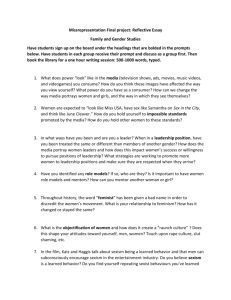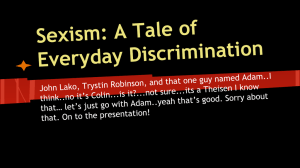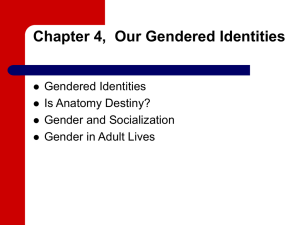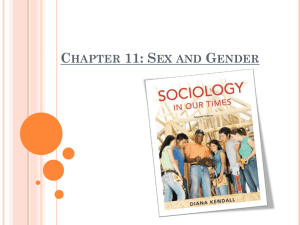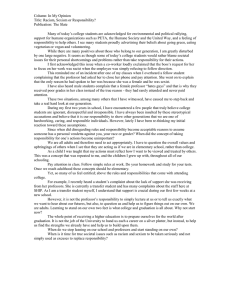University of Connecticut Human Development & Family Studies School of Family Studies
advertisement
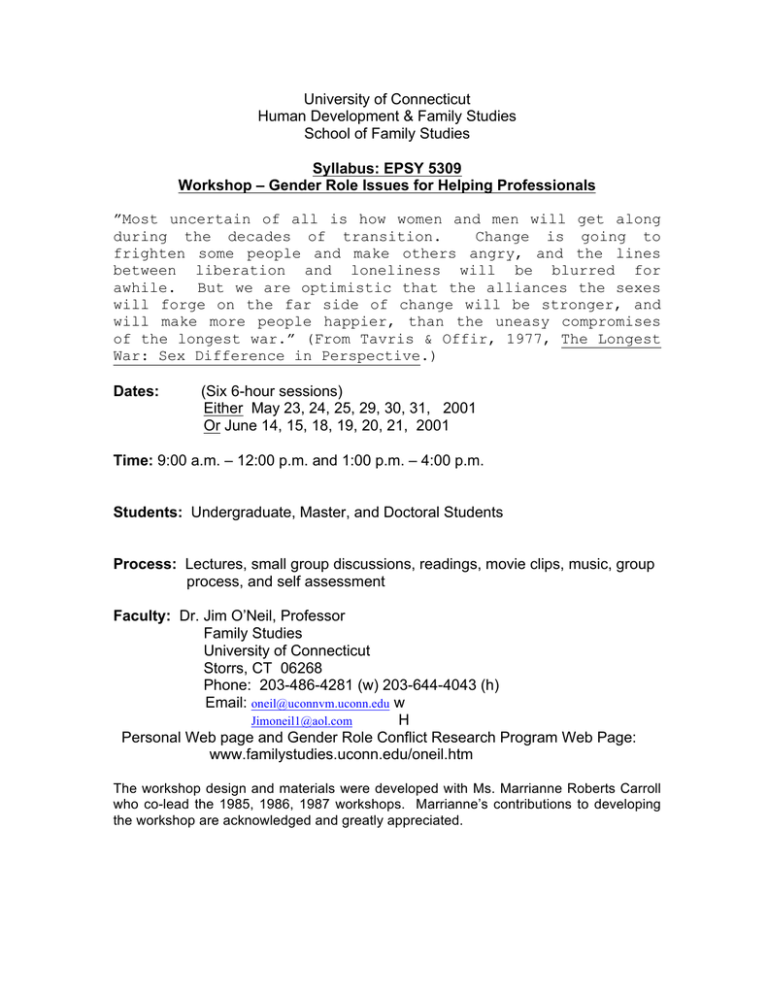
University of Connecticut Human Development & Family Studies School of Family Studies Syllabus: EPSY 5309 Workshop – Gender Role Issues for Helping Professionals ”Most uncertain of all is how women and men will get along during the decades of transition. Change is going to frighten some people and make others angry, and the lines between liberation and loneliness will be blurred for awhile. But we are optimistic that the alliances the sexes will forge on the far side of change will be stronger, and will make more people happier, than the uneasy compromises of the longest war.” (From Tavris & Offir, 1977, The Longest War: Sex Difference in Perspective.) Dates: (Six 6-hour sessions) Either May 23, 24, 25, 29, 30, 31, 2001 Or June 14, 15, 18, 19, 20, 21, 2001 Time: 9:00 a.m. – 12:00 p.m. and 1:00 p.m. – 4:00 p.m. Students: Undergraduate, Master, and Doctoral Students Process: Lectures, small group discussions, readings, movie clips, music, group process, and self assessment Faculty: Dr. Jim O’Neil, Professor Family Studies University of Connecticut Storrs, CT 06268 Phone: 203-486-4281 (w) 203-644-4043 (h) Email: oneil@uconnvm.uconn.edu w Jimoneil1@aol.com H Personal Web page and Gender Role Conflict Research Program Web Page: www.familystudies.uconn.edu/oneil.htm The workshop design and materials were developed with Ms. Marrianne Roberts Carroll who co-lead the 1985, 1986, 1987 workshops. Marrianne’s contributions to developing the workshop are acknowledged and greatly appreciated. Course Description Intensive review of gender role socialization in a workshop setting, emphasizing men’s and women’s gender role conflicts across the life span. Lectures, readings, discussions, media, and self assessments are used to explicate core concepts and themes. Course Goals 1. 2. 3. 4. 5. 6. 7. 8. 9. 10. 11. 12. 13. 14. 15. To define gender role terms and concepts from the literature To review the biological, socialization, and cultural bases of gender role socialization of men and women. To define the gender role journey across the life cycle. To review research on sex differences, gender role socialization, gender role stereotypes, and gender role conflict. To specify gender role restrictions, devaluations, and violations. To enumerate men and women’s patterns of gender role conflict. To review research on men and women’s gender role conflict. To discuss life span implications on gender role change. To define gender role transitions and the gender role themes of men and women. To discuss family socialization patterns of men and women. To discuss relationship between family violence and gender role conflict. To encourage learners self assessment of gender role issues in the lives. To help students identify their personal, professional, political issues with gender roles. To assist students in developing action plans related to the course content. To have students evaluate the workshop each day, immediately after the workshop and over one and three month intervals. Workshop Curriculum The curriculum of the workshop is summarized in detail in Table 1. On the left side of Table 1 five workshop dimensions represent the range of themes and activities in the workshop. Across the top are listed the six days of the workshop. Each day new themes are introduced using lectures, music-media, structuredexperiential exercises, and small-large group discussions. Mini-lectures, media presentations, and personal self disclosures are the primary modes of teaching and learning. Reading down Table 1 vertically, each day’s activities are delineated. 2 There are specific themes underlying the curriculum. First, the curriculum establishes specific definitions of gender role concepts through preassigned readings and lectures. This common terminology provides an understanding of the relationship between socialized gender roles and sexism. Furthermore, the workshop curriculum presumes that sexism is a form of violence between and among men and women and, therefore, a potentially volatile interpersonal issue. Consequently, the curriculum is defined as a vehicle for people to nonviolently discuss the effects of sexism using the gender role journey phases as defined in the workshop. Third, the curriculum is designed to elicit personal exploration in both the cognitive and affective domains of learning by using theory, research, and group activities. Fourth, the curriculum is developed so that the ongoing group process can become part of the workshop content. Group leaders help participants identify specific examples of sexism and gender role conflict as they occurred with and between group members. Fifth, greater personalization of the curriculum is possible by using music, movie clips, self assessments, and group activities. Also, personal disclosures by the leaders and presentation of famous person’s gender role journeys (i.e., John Lennon, Jane Fonda, and Marvin Gay) provide a basis for participants’ own assessment of their journeys, conflicts, and positive potentials. Below is a summary of the daily themes of the Workshop: Day Themes and Topics 1 Expectations, Norms, Goals, Definitions, Violence, The Gender Role Journey, Guided Imagery of Socialization 2 Sex Differences, Gender Role Socialization, Stereotyping, Gender Role Devaluations, Restrictions, and Violations 3 Patterns of Gender Role Conflict (Men) Patterns of Gender Role Conflict (Women) 4 Adult Life Cycle, Gender Role Transitions and Themes, Relationships Issues and Enhancements 5 Family Socialization: Mothers, Fathers, Sons and Daughters 6 Workshop Summary, Action Plans, Course Closure, and Evaluations 3 Workshop Assumptions and Principles The workshop design assumes that adults need to talk with each other about sexism and gender role conflicts as part of the healing process. Additionally, it is assumed that alliances between men and women (Birk, 1981) are possible and necessary for each sexes’ growth and understanding. It is assumed that discussions about gender roles and sexism can be difficult, dynamic, and emotional. Six principles guide the workshop’s preparation and implementation. First, adults struggle to integrate new definitions of gender roles as they face life events. Second, adults have varying degrees of awareness about the negative outcomes of restrictive gender role and sexism. Third, adults need an expanded “gender role vocabulary” to express their thoughts and feelings on changing gender roles. Fourth, adults can experience conflicts and negative emotions as they become aware of sexism. Fifth, adults can understand gender role conflict in the context of gender role journey. Finally, dialogue about gender role and sexism can be constructive and nonviolent if there is a commitment to mutual support and understanding. Workshop Process Before the workshop, participants read seven manuscripts providing background on gender roles and sexism (Albee, 1981; Kahn, 1984; O’Neil, 1981a, 1981b; O’Neil & Egan, 1992a, 1992b, 1992c) and Chapters 1-4, 8-13 of Basow (1992). These readings focus on men’s and women’s sexism and gender role socialization. Also, a workshop manual (O’Neil, 1987) concisely collates the theoretical and conceptual ideas in the workshop. This manual includes a select bibliography, workshop definitions, transparencies, course objectives, special readings, and media used during the six days. The manual is used to guide participants’ learning as well as provide a vocabulary to discuss gender role issues. A preworkshop needs assessment is administered through the mail to assess participant’s expectancies, needs, and attitudes about gender roles. These data are gathered to better understand the participants and allow their direct input into the workshop design (see O’Neil & Roberts Carroll, 1987). Participants fill out evaluations forms daily assessing the day’s activities and process. These daily evaluations provide feedback for preparing the next day’s workshop content and process. On the last day of the workshop, participants prepare actions plans, specifying in detail what they could do about sexism personally, professionally, and politically over the coming months. 4 Workshop Norms Specific norms are established early in the workshop and guide the group process. The following workshop norms are established and monitored during the six days: • • • • • • • • • • • • personal comfort and safety freedom of movement and self expression interpersonal respect (O’Neil & Wrightsman, 1988) personal nonviolence emotional and intellectual expressions nonviolent expressions of anger prohibition of victimization and interpersonal violence mutual support self assessments, self disclosures, and positive regard for individual differences careful listening and “tracking” the group process monitoring personal “talk time” in the group developing friendships and alliances with others Workshop Leader Roles The leader of the workshop is one (male) Ph.D. level counseling psychologist. The workshop design required a wide range of roles and skills for the leader including: 1) teaching, 2) personal self disclosing, 3) balancing content and process oriented learning, 4) facilitating group dynamics, 5) conflict and differences, 6) structuring group activities, 7) mediating conflict and differences, 8) identifying power, control, and competition issues in the group, 9) collating and interpreting daily evaluations, 10) preparing refreshments, 11) making decisions on the direction of the group. Stimulus Diversity and Media Lectures and audio-visual media are used continuously throughout the workshop as part of the stimulus diversity (See Table 1). Stimulus diversity is defined as employing sequential teaching interventions to stimulate personal feelings, thoughts, and self exploration. For example, a brief lecture might be immediately followed by a self assessment experience, then a period of reflection or small group discussion, and then a musical recording or movie clip emphasizing the same content in a moving or humorous way. After a series of stimuli, the workshop members discuss how the process influenced them conceptually, emotionally, and personally. 5 Below are listed the media used in the workshop. Selected Movie Clips from: Ordinary People The Honeymooners On Golden Pond The Four Seasons Kramer vs. Kramer Superman III Nine to Five Tootsie Ghandi Musical Recordings: • • • • • • • • • • • • • • • • • • • • • • • • • • • • • • • • Bach Brandenburg Concert #2, 5, 6 The Four Seasons – Vivaldi Airport – Brian Eno Bach Musical Offering Bach’s Concerto in D Minor Bach Concerto No. 1 in A Minor Bach Concerto No. 2 in E Minor Bach Concerto No. 2 in A Minor Hard Time for Lovers – Judy Collins Feeling Better – Holly Near Free to Grow – Holly Near The Homecoming Queen Got a Gun – Julie Brown I Like ‘Em Big and Stupid – Julie Brown I Want To Know What Love Is – C.M. Jones Cover Me – Bruce Springsteen Dancing in the Dark – Bruce Springsteen Stop in the Name of Love – The Hollies Child – Holly Near Power – Holly Near The Greatest Love of All – George Benson What’s Going On – Marvin Gay Sexual Healing – Marvin Gay Missing You – Diana Ross Mother – John Lennon Women is the Nigger of the World – John Lennon Women – John Lennon Hey Johnie (Empty Garden) – Elton John That’s What Friends Are For – D. Warwick, S. Wonder, G. Knight, & E. John American Tune – Simon & Garfunkel Bridge Over Troubled Waters – Simon & Garfunkel Between Two Worlds (New Age Music) – Patrick O’Hearn House of Sleeping Beauties (New Age Music) – Lucia Hwong 6 Artist’s Contribution to the Workshop: • • • • • • • • • • • • • • • • • • • • • • • • • • • • • • • • • J.S. Bach Diana Ross Vivaldi Dionne Warwick, Stevie Wonder, Gladis Knight, Elton John Julie Brown Simon and Garfunkel Marvin Gay Jackie Gleason – The Honeymooners John Lennon Lucia Hwong – New Age Music Yoko Ono Patrick O’Hearn (New Age Music) Between Two Worlds Henry Fonda Joan Baez Jane Fonda Brian Eno Bruce Springsteen Isaac Stern and London Symphony Orchestra Dolly Parton Four Tops & Temptations Lily Tomlin Judy Collins Holy Near George Benson Superman Harry Chapin Dustin Hoffman The Foreigner The Hollies Michael Jackson Elton John The Beatles U-2 Required Readings Major Texts: Basow, S.A.(1992).Gender stereotypes: Traditions and alternatives. Monterey, CA: Brooks/Cole Publishing Co. (Read Chapters 1-4 and 8-13). 7 O’Neil, J.M. (1995).Resource manual for Gender Role Journey Workshop. School of Family Studies, University of Connecticut, Storrs, CT Articles Albee, G.W. (1981). The prevention of sexism. Professional Psychology,12, 2028. Kahn, A. (1984). The power war: Male response to power loss under equality. Psychology of Women Quarterly,8, (3), 234-247. O’Neil, J.M. (1981a). Patterns of gender role conflict and strain: The fear of femininity in men’s lives. The Personnel and Guidance Journal,60, 203-210. O’Neil, J.M. (1981b). Male sex-role conflicts, sexism, and masculinity: Psychological implications for men, women and the counseling psychologist. The Counseling Psychologist,9, 61-80. O’Neil, J.M. & Egan, J. (1992a). Men’s gender role transitions over the life span: Transformation and fears of femininity. Journal of Mental Health Counseling,14, 306-324. O’Neil, J.M. & Egan, J. (1992b). Men’s and women’s gender role journeys: A metaphor for healing, transitions, and transformation. In B. Wainrib (Ed.)Gender issues across the life cycle. New York: Springer Publishing Company. O’Neil, J.M. & Egan, J. (1992c). Abuses of power against women: Sexism, gender role conflict, psychological violence, implications for the counselors of women. In E. Cook (Ed.)Counseling Women. Alexandria, VA: AACD Press. Required Attendance – Attendance at all workshop sessions is required, very important and part of the course requirement. Given the short duration of the course, missing even a half day can affect the learning and the workshop process. Only medical and family emergencies are grounds for missing any of the workshop sessions. Weddings, vacations, and other social events are not grounds for missing any of the workshop sessions. Exceptions to the above are very rare and problems attending all sessions should be discussed with the instructor before the workshop begins. Assignment – Final Summary Paper The written requirement of the workshop is a two-page or more summary of your experience of the workshop. Students may wish to discuss any aspect of masculinity, femininity, or gender role conflict. This analysis can be personal, professional, or political. It should be typed and sent to the instructor one month after the workshop. The students wanting comments or their paper sent back should provide two copies and a return mailing address. 8 Assignment – Workshop Learning Units All students will complete the workshop learning units directly related to the workshop definitions and readings. The goal of these units is to help students prepare for the workshop and to focus the cognitive learning process. The learning units will be completed and turned in to the workshop leader on the first day of the workshop. 9
